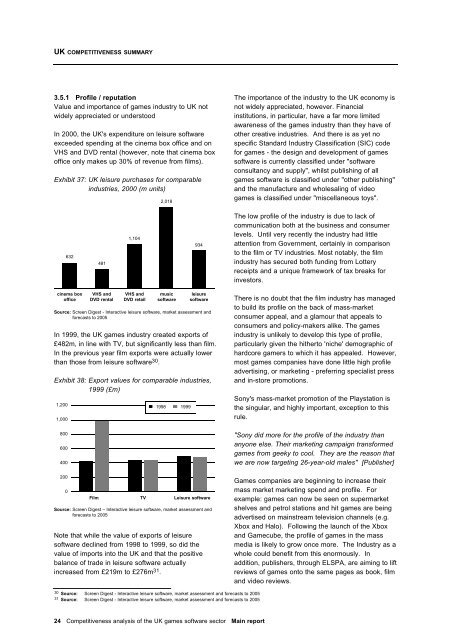From Exuberant Youth to Sustainable Maturity - DTI Home
From Exuberant Youth to Sustainable Maturity - DTI Home
From Exuberant Youth to Sustainable Maturity - DTI Home
Create successful ePaper yourself
Turn your PDF publications into a flip-book with our unique Google optimized e-Paper software.
UK COMPETITIVENESS SUMMARY<br />
3.5.1 Profile / reputation<br />
Value and importance of games industry <strong>to</strong> UK not<br />
widely appreciated or unders<strong>to</strong>od<br />
In 2000, the UK's expenditure on leisure software<br />
exceeded spending at the cinema box office and on<br />
VHS and DVD rental (however, note that cinema box<br />
office only makes up 30% of revenue from films).<br />
Exhibit 37: UK leisure purchases for comparable<br />
industries, 2000 (m units)<br />
cinema box<br />
office<br />
Source: Screen Digest - Interactive leisure software, market assessment and<br />
forecasts <strong>to</strong> 2005<br />
In 1999, the UK games industry created exports of<br />
£482m, in line with TV, but significantly less than film.<br />
In the previous year film exports were actually lower<br />
than those from leisure software 30 .<br />
Exhibit 38: Export values for comparable industries,<br />
1999 (£m)<br />
1,200<br />
1,000<br />
800<br />
600<br />
400<br />
200<br />
632<br />
0<br />
481<br />
VHS and<br />
DVD rental<br />
1,104<br />
VHS and<br />
DVD retail<br />
2,018<br />
music<br />
software<br />
1998 1999<br />
leisure<br />
software<br />
Note that while the value of exports of leisure<br />
software declined from 1998 <strong>to</strong> 1999, so did the<br />
value of imports in<strong>to</strong> the UK and that the positive<br />
balance of trade in leisure software actually<br />
increased from £219m <strong>to</strong> £276m 31 .<br />
24 Competitiveness analysis of the UK games software sec<strong>to</strong>r Main report<br />
934<br />
Film TV Leisure software<br />
Source: Screen Digest – Interactive leisure software, market assessment and<br />
forecasts <strong>to</strong> 2005<br />
30 Source: Screen Digest - Interactive leisure software, market assessment and forecasts <strong>to</strong> 2005<br />
31 Source: Screen Digest - Interactive leisure software, market assessment and forecasts <strong>to</strong> 2005<br />
The importance of the industry <strong>to</strong> the UK economy is<br />
not widely appreciated, however. Financial<br />
institutions, in particular, have a far more limited<br />
awareness of the games industry than they have of<br />
other creative industries. And there is as yet no<br />
specific Standard Industry Classification (SIC) code<br />
for games - the design and development of games<br />
software is currently classified under "software<br />
consultancy and supply", whilst publishing of all<br />
games software is classified under "other publishing"<br />
and the manufacture and wholesaling of video<br />
games is classified under "miscellaneous <strong>to</strong>ys".<br />
The low profile of the industry is due <strong>to</strong> lack of<br />
communication both at the business and consumer<br />
levels. Until very recently the industry had little<br />
attention from Government, certainly in comparison<br />
<strong>to</strong> the film or TV industries. Most notably, the film<br />
industry has secured both funding from Lottery<br />
receipts and a unique framework of tax breaks for<br />
inves<strong>to</strong>rs.<br />
There is no doubt that the film industry has managed<br />
<strong>to</strong> build its profile on the back of mass-market<br />
consumer appeal, and a glamour that appeals <strong>to</strong><br />
consumers and policy-makers alike. The games<br />
industry is unlikely <strong>to</strong> develop this type of profile,<br />
particularly given the hither<strong>to</strong> 'niche' demographic of<br />
hardcore gamers <strong>to</strong> which it has appealed. However,<br />
most games companies have done little high profile<br />
advertising, or marketing - preferring specialist press<br />
and in-s<strong>to</strong>re promotions.<br />
Sony's mass-market promotion of the Playstation is<br />
the singular, and highly important, exception <strong>to</strong> this<br />
rule.<br />
"Sony did more for the profile of the industry than<br />
anyone else. Their marketing campaign transformed<br />
games from geeky <strong>to</strong> cool. They are the reason that<br />
we are now targeting 26-year-old males" [Publisher]<br />
Games companies are beginning <strong>to</strong> increase their<br />
mass market marketing spend and profile. For<br />
example: games can now be seen on supermarket<br />
shelves and petrol stations and hit games are being<br />
advertised on mainstream television channels (e.g.<br />
Xbox and Halo). Following the launch of the Xbox<br />
and Gamecube, the profile of games in the mass<br />
media is likely <strong>to</strong> grow once more. The Industry as a<br />
whole could benefit from this enormously. In<br />
addition, publishers, through ELSPA, are aiming <strong>to</strong> lift<br />
reviews of games on<strong>to</strong> the same pages as book, film<br />
and video reviews.
















